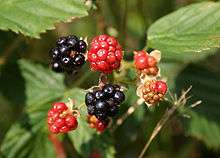silva
English
Noun
silva (uncountable)
Alternative forms
Related terms
Galician
Silvas
Etymology
From Old Galician/Old Portuguese silva, from Latin silva (“forest”).
Pronunciation
- IPA(key): /ˈsilβa̝/
Noun
silva f (plural silvas)
- bramble, blackberry bush
- 1460, José Antonio Souto Cabo (ed.), Crónica de Santa María de Íria. Santiago: Ediciós do Castro, page 101:
- vijã grande[s] lumes de candeas arder de noyte et de dia en huũ monte muy espeso de muytas aruores et siluas, a oyto mjlias de Yria
- they saw large candle fires, burning day and night, in a very close forest, of trees and bambles, eight milles from Iria
- vijã grande[s] lumes de candeas arder de noyte et de dia en huũ monte muy espeso de muytas aruores et siluas, a oyto mjlias de Yria
- 1884, Marcial Valladares Núñez, Diccionario gallego-castellano, s.v. silva:
- Tente, silva; non me prendas, que n'estou n'a miña tèrra (traditional song)
- Hold yourself, bramble, don't catch me, 'cos I'm not in my country
- Tente, silva; non me prendas, que n'estou n'a miña tèrra (traditional song)
- 1460, José Antonio Souto Cabo (ed.), Crónica de Santa María de Íria. Santiago: Ediciós do Castro, page 101:
- (archaic) forest
Related terms
References
- “silua” in Dicionario de Dicionarios do galego medieval, SLI - ILGA 2006-2012.
- “silua” in Xavier Varela Barreiro & Xavier Gómez Guinovart: Corpus Xelmírez - Corpus lingüístico da Galicia medieval. SLI / Grupo TALG / ILG, 2006-2016.
- “silva” in Dicionario de Dicionarios da lingua galega, SLI - ILGA 2006-2013.
- “silva” in Tesouro informatizado da lingua galega. Santiago: ILG.
- “silva” in Álvarez, Rosario (coord.): Tesouro do léxico patrimonial galego e portugués, Santiago de Compostela: Instituto da Lingua Galega.
Latin
Alternative forms
Etymology
From Proto-Indo-European *sel-, *swel- (“beam, board, frame, threshold”). Cognate with Ancient Greek ὕλη (húlē, “wood, timber”) and Old English syl (“sill, threshold, foundation”).
Pronunciation
- (Classical) IPA(key): /ˈsil.wa/, [ˈsɪɫ.wa]
- (Ecclesiastical) IPA(key): /ˈsil.va/
Audio (Classical) (file)
Inflection
First declension.
| Case | Singular | Plural |
|---|---|---|
| Nominative | silva | silvae |
| Genitive | silvae | silvārum |
| Dative | silvae | silvīs |
| Accusative | silvam | silvās |
| Ablative | silvā | silvīs |
| Vocative | silva | silvae |
Derived terms
- Silvānus
- silvāticus
- silvēscō
- silvestris
- Silvia
- silvicaedus
- silvicola
- silvicolens
- silvicomus
- silvicultrīx
- silvifragus
- silviger
- Silvius
- silvōsus
- silvula
Descendants
References
- silva in Charlton T. Lewis and Charles Short (1879) A Latin Dictionary, Oxford: Clarendon Press
- silva in Charlton T. Lewis (1891) An Elementary Latin Dictionary, New York: Harper & Brothers
- silva in Charles du Fresne du Cange’s Glossarium Mediæ et Infimæ Latinitatis (augmented edition, 1883–1887)
- silva in Gaffiot, Félix (1934) Dictionnaire Illustré Latin-Français, Hachette
- Carl Meissner; Henry William Auden (1894) Latin Phrase-Book, London: Macmillan and Co.
- wooded hills: montes vestiti silvis
- wooded hills: montes vestiti silvis
Portuguese

silvas
Etymology
From Old Portuguese silva, from Latin silva, from Proto-Indo-European *swel-, *sel- (“mountain, ridge, forest”). Compare the doublet selva and Galician silva.
Pronunciation
Romanian
This article is issued from
Wiktionary.
The text is licensed under Creative
Commons - Attribution - Sharealike.
Additional terms may apply for the media files.